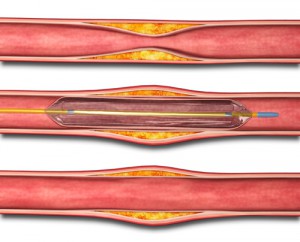Services »
Cardiac Therapy » Interventional Catheterization Procedure
General Overview

Cardiac Catheterization is a procedure which is used for diagnosis of coronary artery disease. If there are blockages and if it can intervened non-invasively, percutaneous coronary intervention can be performed in the same setting. Cardiac Catheterization can also be used to diagnose heart valve problems and measure pressures in the right and the left side of the heart.
How It’s Done
The cardiologist introduces a small sheath either in your wrist or in the groin. Then a catheter is passed all the way into the arteries around the heart. Then dye is injected through the catheters and through X-rays blockages in the arteries could be identified. If there are blockages, a fine wire is used to cross the blockage. Then, the blockage is usually opened by balloon and then stent may be placed to keep it open. Adjunctive newer technologies and techniques may be used for safer and more effective management of the disease process. An enlarged blood vessel improves the amount of blood supplied to the heart. The catheters are removed and the sheath is also removed. Patients are usually observed overnight and if there are no further problems are discharged home next day
Any Side Effects?
Some of the possible risks associated with Interventional Catheterization procedure are (but not limited to):
- Irregular heart rhythm
- Bleeding at the site
- Continued chest pain or angina
- Skin reaction
- Kidney failure
- Heart attack, stroke or death
- Infections from medications
Before the procedure, it is important to consult a physician to discuss the risks and benefits of the procedure.
Next Steps
Upon completing the procedure, one must:
- Cover the area of invasion with an adhesive bandage.
- Keep the area neat and clean.
- Avoid using creams or lotions.
- Wear loose clothes for about a week to help in keeping the wound aerated.
Contact Us
With immense experience and expertise in Cardiac Catheterization procedures, we deliver satisfaction to our patients. Please contact us at (302) 338-9444 for further discussion about our services.
 Cardiac Catheterization is a procedure which is used for diagnosis of coronary artery disease. If there are blockages and if it can intervened non-invasively, percutaneous coronary intervention can be performed in the same setting. Cardiac Catheterization can also be used to diagnose heart valve problems and measure pressures in the right and the left side of the heart.
Cardiac Catheterization is a procedure which is used for diagnosis of coronary artery disease. If there are blockages and if it can intervened non-invasively, percutaneous coronary intervention can be performed in the same setting. Cardiac Catheterization can also be used to diagnose heart valve problems and measure pressures in the right and the left side of the heart.
